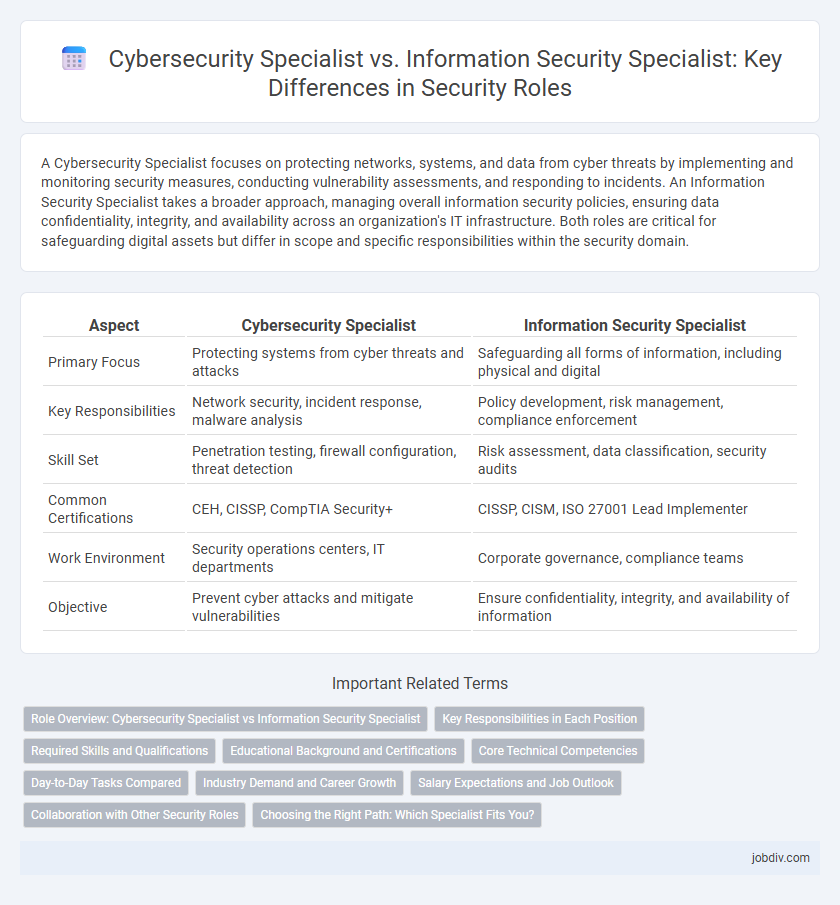A Cybersecurity Specialist focuses on protecting networks, systems, and data from cyber threats by implementing and monitoring security measures, conducting vulnerability assessments, and responding to incidents. An Information Security Specialist takes a broader approach, managing overall information security policies, ensuring data confidentiality, integrity, and availability across an organization's IT infrastructure. Both roles are critical for safeguarding digital assets but differ in scope and specific responsibilities within the security domain.
Table of Comparison
| Aspect | Cybersecurity Specialist | Information Security Specialist |
|---|---|---|
| Primary Focus | Protecting systems from cyber threats and attacks | Safeguarding all forms of information, including physical and digital |
| Key Responsibilities | Network security, incident response, malware analysis | Policy development, risk management, compliance enforcement |
| Skill Set | Penetration testing, firewall configuration, threat detection | Risk assessment, data classification, security audits |
| Common Certifications | CEH, CISSP, CompTIA Security+ | CISSP, CISM, ISO 27001 Lead Implementer |
| Work Environment | Security operations centers, IT departments | Corporate governance, compliance teams |
| Objective | Prevent cyber attacks and mitigate vulnerabilities | Ensure confidentiality, integrity, and availability of information |
Role Overview: Cybersecurity Specialist vs Information Security Specialist
A Cybersecurity Specialist focuses on protecting computer systems and networks from cyber attacks by implementing firewalls, intrusion detection systems, and conducting vulnerability assessments. An Information Security Specialist oversees the broader spectrum of protecting organizational data, ensuring confidentiality, integrity, and availability across all information assets including physical and digital forms. While both roles aim to safeguard information, the Cybersecurity Specialist is more technically oriented towards defending against external threats, whereas the Information Security Specialist manages comprehensive security policies and compliance.
Key Responsibilities in Each Position
Cybersecurity Specialists focus on protecting networks, systems, and data from cyber threats by implementing security measures, monitoring for vulnerabilities, and responding to incidents. Information Security Specialists manage the confidentiality, integrity, and availability of organizational data through risk assessments, policy development, and compliance enforcement. Both roles require expertise in threat analysis and security protocols, but Cybersecurity Specialists emphasize proactive defense and incident response, while Information Security Specialists prioritize governance and data protection strategies.
Required Skills and Qualifications
Cybersecurity Specialists require expertise in threat detection, vulnerability assessment, and penetration testing, with proficiency in tools like SIEM, IDS/IPS, and ethical hacking techniques. Information Security Specialists focus on risk management, compliance frameworks (e.g., ISO 27001, NIST), and data protection policies, demanding strong knowledge of encryption, access controls, and security governance. Both roles typically require certifications such as CISSP, CISM, or CEH alongside experience in network security and incident response.
Educational Background and Certifications
Cybersecurity Specialists typically hold degrees in computer science, information technology, or cybersecurity and often pursue certifications like Certified Information Systems Security Professional (CISSP) and Certified Ethical Hacker (CEH) to validate their skills. Information Security Specialists generally possess degrees in information security, computer engineering, or related fields, emphasizing risk management and compliance, with certifications such as Certified Information Security Manager (CISM) and CompTIA Security+ enhancing their qualifications. Both roles prioritize continuous education to keep pace with evolving security threats and industry standards.
Core Technical Competencies
Cybersecurity specialists excel in threat detection, incident response, and vulnerability assessment, utilizing tools like IDS/IPS and SIEM platforms to protect network integrity. Information security specialists focus on risk management, compliance frameworks such as ISO 27001 and NIST, and data governance to ensure confidentiality, integrity, and availability of information assets. Both roles require expertise in encryption protocols, access control mechanisms, and security architecture but differ in their emphasis on proactive defense versus policy-driven risk mitigation.
Day-to-Day Tasks Compared
Cybersecurity Specialists focus on protecting systems against cyber threats by implementing firewalls, conducting penetration testing, and monitoring network traffic for suspicious activity. Information Security Specialists prioritize managing data confidentiality, integrity, and availability through risk assessments, compliance audits, and establishing security policies. While both roles overlap in securing digital assets, Cybersecurity Specialists are more hands-on with technical defenses, whereas Information Security Specialists emphasize governance and regulatory adherence.
Industry Demand and Career Growth
The demand for Cybersecurity Specialists is rapidly increasing due to the rise in sophisticated cyber threats, with the industry projected to grow 35% faster than average job sectors through 2031. Information Security Specialists also experience significant growth but often focus on broader data protection, compliance, and risk management across IT infrastructures. Career growth for Cybersecurity Specialists is notably higher in sectors like finance, healthcare, and government, where specialized defense against cyber attacks is critical.
Salary Expectations and Job Outlook
Cybersecurity Specialists typically command higher salary expectations, with median annual wages ranging from $90,000 to $120,000, driven by growing demand for proactive threat mitigation and incident response. Information Security Specialists, while also vital, generally earn between $80,000 and $110,000 and focus on broader data protection and compliance strategies across organizational systems. Job outlook for both roles remains robust, with a projected growth rate of 31% for Cybersecurity Specialists and 33% for Information Security Specialists through 2031, reflecting escalating cyber threats and regulatory requirements.
Collaboration with Other Security Roles
Cybersecurity Specialists collaborate closely with network engineers, threat analysts, and incident responders to detect and mitigate cyber threats in real-time. Information Security Specialists work alongside compliance officers, risk managers, and data privacy teams to establish policies and ensure regulatory adherence across the organization's information assets. Both roles integrate cross-functional expertise to create a robust defense strategy that protects against evolving cyber risks.
Choosing the Right Path: Which Specialist Fits You?
Cybersecurity Specialists focus on protecting systems, networks, and data from cyber threats through proactive defense strategies and threat detection, while Information Security Specialists concentrate on safeguarding organizational information assets by implementing policies, risk management, and compliance measures. Choosing the right path depends on whether you prefer hands-on technical defense work or strategic policy development and governance. Assess your strengths in either real-time threat mitigation or structured information risk management to align your career goals effectively.
Cybersecurity Specialist vs Information Security Specialist Infographic

 jobdiv.com
jobdiv.com